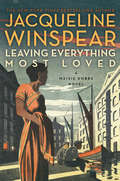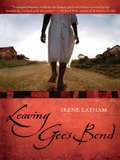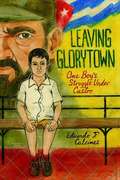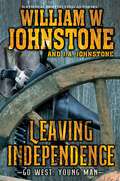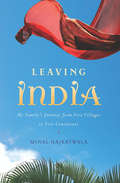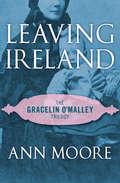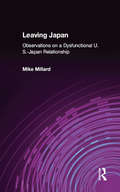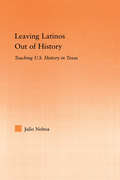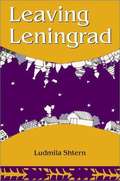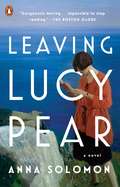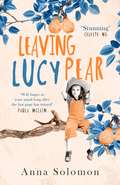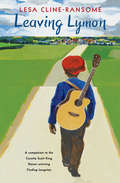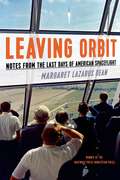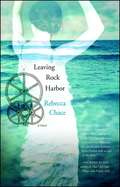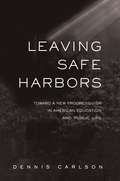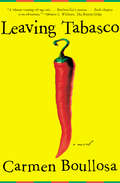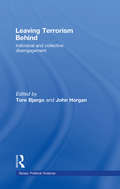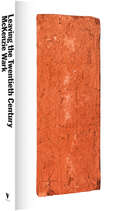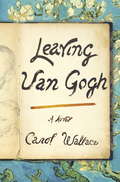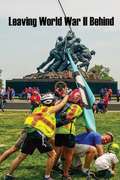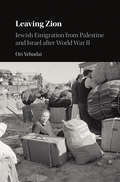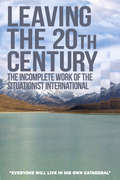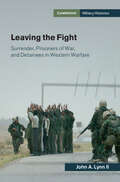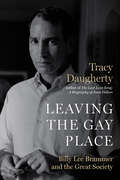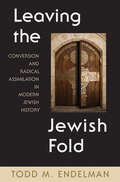- Table View
- List View
Leaving Everything Most Loved: A Maisie Dobbs Novel (Maisie Dobbs #10)
by Jacqueline WinspearThe death of an Indian immigrant leads Maisie Dobbs into a dangerous yet fascinating world and takes her in an unexpected direction in this latest chapter of the New York Times bestselling series "that seems to get better with each entry" (Wall Street Journal).London, 1933. Two months after the body of an Indian woman named Usha Pramal is found in the brackish water of a South London canal, her brother, newly arrived in England, turns to Maisie Dobbs to find out the truth about her death. Not only has Scotland Yard made no arrests, evidence indicates that they failed to conduct a full and thorough investigation.Before her death, Usha was staying at an ayah's hostel alongside Indian women whose British employers turned them out into the street--penniless and far from their homeland--when their services were no longer needed. As Maisie soon learns, Usha was different from the hostel's other lodgers. But with this discovery comes new danger: another Indian woman who had information about Usha is found murdered before she can talk to Maisie.As Maisie is pulled deeper into an unfamiliar yet captivating subculture, her investigation becomes clouded by the unfinished business of a previous case as well as a growing desire to see more of the world, following in the footsteps of her former mentor, Maurice Blanche. And there is her lover, James Compton, who gives her an ultimatum she cannot ignore.Bringing a crucial chapter in the life and times of Maisie Dobbs to a close, Leaving Everything Most Loved marks a pivotal moment in this remarkable series.
Leaving Gee's Bend
by Irene LathamLudelphia Bennett may be blind in one eye, but she can still put in a good stitch. Ludelphia sews all the time, especially when things go wrong. But when Mama goes into labor early and gets deathly ill, it seems like even quilting won?t help. That?s when Ludelphia decides to do something drastic?leave Gee?s Bend for the very first time. Mama needs medicine that can only be found miles away in Camden. But that doesn?t stop Ludelphia. She just puts one foot in front of the other. What ensues is a wonderful, riveting and sometimes dangerous adventure. Ludelphia weathers each challenge in a way that would make her mother proud, and ends up saving the day for her entire town. Set in 1932 and inspired by the rich quilting history of Gee?s Bend, Alabama, Leaving Gee?s Bend is a delightful, satisfying story of a young girl facing a brave new world. .
Leaving Glorytown: One Boy's Struggle under Castro
by Eduardo F. CalcinesIn this absorbing memoir, by turns humorous and heartbreaking, Eduardo Calcines recounts his boyhood and chronicles the conditions that led him to wish above all else to leave behind his beloved extended family and his home for a chance at a better future.
Leaving Independence (Go West, Young Man)
by William W. Johnstone J.A. JohnstoneLegendary national bestselling Western authors William W. Johnstone and J.A. Johnstone return with their latest installment in the long-running First Mountain Man series. Independence, Missouri, 1865. Seasoned wagon master Virgil Grissom prepares to lead a new group of families westward across the Oregon Trail. Among them are struggling farmer Matt Moran, his wife Katie, and their three small children. In spite of the long, treacherous journey ahead, Grissom is confident that this solid, hard-working farmer and his family are tough enough to endure the harsh elements, the rugged terrain, and the occasional run-in with hostile tribes. But he&’s not so sure about the farmer&’s younger brother, Clay, who plans to catch up with them along the trail. Alone. Which has Grissom worried . . . On the Oregon Trail, a lone man is dead man. Clay Moran fought hard in the Civil War, serving as lieutenant in the US Calvary. Now that Robert E. Lee has surrendered, Clay is free to head west with his brother&’s family. Problem is, the wagon train has left Independence already—and Clay has to go it alone. Luckily, the army let him keep his horse. But when a couple of bushwhackers steal that horse and all his money, he&’s left high and dry. If Clay hopes to catch up with the wagon train, he&’ll have to rely on his wits. His guts. And every skill he learned in the war. Along the way, he&’ll have to do things a man should never have to do—just to survive . . . JOHNSTONE COUNTRY. GO WEST, LIVE FREE, OR DIE TRYING.
Leaving India: My Family's Journey from Five Villages to Five Continents
by Minal HajratwalaThe PEN Award–winning chronicle of the Indian diaspora told through the stories of the author&’s own family. In this &“rich, entertaining and illuminating story,&” Minal Hajratwala mixes history, memoir, and reportage to explore the collisions of choice and history that led her family to emigrate from India (San Francisco Chronicle). &“Meticulously researched and evocatively written&” (The Washington Post), Leaving India looks for answers to the eternal questions that faced not only Hajratwala&’s own Indian family but all immigrants, everywhere: Where did we come from? Why did we leave? What did we give up and gain in the process? Beginning with her great-grandfather Motiram&’s original flight from British-occupied India to Fiji, where he rose from tailor to department store mogul, Hajratwala follows her ancestors across the twentieth-century to explain how they came to be spread across five continents and nine countries. As she delves into the relationship between personal choice and the great historical forces—British colonialism, apartheid, Gandhi&’s salt march, and American immigration policy—that helped shape her family&’s experiences, Hajratwala brings to light for the very first time the story of the Indian diaspora. A luminous narrative from &“a fine daughter of the continent, bringing insight, intelligence and compassion to the lives and sojourns of her far-flung kin,&” Leaving India offers a deeply intimate look at what it means to call more than one part of the world home (Alice Walker).
Leaving Ireland: Gracelin O'malley, Leaving Ireland, And 'til Morning Light (The Gracelin O'Malley Trilogy #2)
by Ann MooreAn Irish mother must flee her beloved homeland for a new life in America, in the &“gripping&” second novel of the acclaimed historical trilogy (Publishers Weekly). Forced to flee Ireland, Gracelin O&’Malley boards a coffin ship bound for America, taking her young daughter with her on the arduous transatlantic voyage. In New York, Gracelin struggles to adapt to a strange new world and to the harsh realities of immigrant life in a city teeming with crime, corruption, and anti-Irish prejudice. As she tries to make a life for herself and her daughter, she reunites with her brother, Sean . . . and a man she thought she&’d never see again. When her friendship with a runaway slave sweeps her into the volatile abolitionist movement, Gracelin gains entrée to the drawing rooms of the wealthy and powerful. Still, the injustice all around her threatens the future of those she loves, and once again, she must do the unthinkable. This sweeping novel of the Irish immigrant experience in 1840s America brings a long-ago world to vibrant life and continues a remarkable heroine&’s bold, dramatic journey through extraordinary times.
Leaving Japan: Observations on a Dysfunctional U.S.-Japan Relationship
by Mike MillardA critique of America's flawed Asia policy that centres on US-Japan relations but harkens back to the same disastrous views that drew America into Vietnam. The technique is a narrative flow of short vignettes woven into longer chapters; the main strands are personal reflections and interviews.
Leaving Latinos Out of History: Teaching US History in Texas
by Julio NoboaDespite being the state with perhaps the longest history of Latino presence, power and influence, Texas has very much under-represented Latinos in its schools history curriculum. Through an analysis of teaching materials and curriculum goals, Noboa investigates the extent to which this significant minority is effectively excluded from American historical narrative.
Leaving Leningrad
by Ludmila ShternAlthough women writers have held a conspicuous place in the history of modern Russian literature, they have been slow to find their true voices in exile. Ludmila Shtern, a geologist/writer who emigrated to the US from the Soviet Union in 1975, offers a completely fresh, unsentimental look at daily life in the former Soviet Union and the US in the second half of the 20th century. Her memoir, part comic bildungsroman, part picaresque adventure, shows its heroine, Tatyana Dargis, growing up in the USSR, falling in love, falling afoul of the KGB, and finally emigrating to the US where new absurdities (capitalist rather than communist in nature) prevail. An amalgam of bittersweet understatement and mordant wit, Shtern's prose is shaped by her ear for a wide range of human voices and the stories they tell, and by her eye for the grotesqueries and savagely funny pain of modern life.
Leaving Lucy Pear
by Anna Solomon"Anna Solomon writes with a poet's reverence for language and a novelist's ability to keep us turning the page. A gorgeous and engrossing meditation on motherhood, womanhood, and the sacrifices we make for love."--J. Courtney Sullivan, author of Maine and The EngagementsChosen as a must-read book for summer 2016 by TIME Magazine, InStyle, Us Weekly, Good Housekeeping, and The MillionsSet in 1920s New England, the story of two women who are both mothers to the same unforgettable girl--a big, heartrending novel from award-winning writer Anna SolomonOne night in 1917 Beatrice Haven sneaks out of her uncle's house on Cape Ann, Massachusetts, leaves her newborn baby at the foot of a pear tree, and watches as another woman claims the infant as her own. The unwed daughter of wealthy Jewish industrialists and a gifted pianist bound for Radcliffe, Bea plans to leave her shameful secret behind and make a fresh start. Ten years later, Prohibition is in full swing, post-WWI America is in the grips of rampant xenophobia, and Bea's hopes for her future remain unfulfilled. She returns to her uncle's house, seeking a refuge from her unhappiness. But she discovers far more when the rum-running manager of the local quarry inadvertently reunites her with Emma Murphy, the headstrong Irish Catholic woman who has been raising Bea's abandoned child--now a bright, bold, cross-dressing girl named Lucy Pear, with secrets of her own.In mesmerizing prose, award-winning author Anna Solomon weaves together an unforgettable group of characters as their lives collide on the New England coast. Set against one of America's most turbulent decades, Leaving Lucy Pear delves into questions of class, freedom, and the meaning of family, establishing Anna Solomon as one of our most captivating storytellers.From the Hardcover edition.
Leaving Lucy Pear
by Anna Solomon'Stunning language, raw emotion and profound wisdom' Celeste Ng, author of Everything I Never Told You'Solomon's strong prose and fleet pacing consistently provide the essential pleasures of a good story well told' Maggie Shipstead, The New York Times Book ReviewOne night in 1917 Beatrice Haven creeps out of her uncle's house on Cape Ann, Massachusetts, leaves her newborn baby at the foot of a pear tree, and watches as another woman claims the child as her own. A gifted pianist bound for Radcliffe, Bea plans to leave her shameful secret behind and make a fresh start. Ten years later, Prohibition is in full swing, post-WWI America is in the grips of rampant xenophobia, and Bea has returned to her uncle's house, seeking a refuge from her unhappiness. But the rum-running manager of the local quarry inadvertently reunites her with Emma Murphy, the headstrong Irish Catholic woman who has been raising her abandoned child - now a bright, bold, cross-dressing girl named Lucy Pear, with secrets of her own...
Leaving Lymon
by Lesa Cline-RansomeBehind every bad boy is a story worth hearing and at least one chance for redemption. It's 1946 and Lymon, uprooted from his life in the Deep South and moved up North, needs that chance. <P><P>Lymon's father is, for the time being, at Parchman Farm--the Mississippi State Penitentiary--and his mother, whom he doesn't remember all that much, has moved North. Fortunately, Lymon is being raised by his loving grandparents. Together, Lymon and his grandpops share a love of music, spending late summer nights playing the guitar. But Lymon's world as he knows it is about to dissolve. He will be sent on a journey to two Northern cities far from the country life he loves--and the version of himself he knows. In this companion novel to the Coretta Scott King Honor wining Finding Langston, readers will see a new side of the bully Lymon in this story of an angry boy whose raw talent, resilience, and devotion to music help point him in a new direction. <P><P>A Junior Library Guild Selection!
Leaving Orbit: Notes from the Last Days of American Spaceflight
by Margaret Lazarus DeanWinner of the Graywolf Press Nonfiction Prize, a breathtaking elegy to the waning days of human spaceflight as we have known itIn the 1960s, humans took their first steps away from Earth, and for a time our possibilities in space seemed endless. But in a time of austerity and in the wake of high-profile disasters like Challenger, that dream has ended. In early 2011, Margaret Lazarus Dean traveled to Cape Canaveral for NASA's last three space shuttle launches in order to bear witness to the end of an era. With Dean as our guide to Florida's Space Coast and to the history of NASA, Leaving Orbit takes the measure of what American spaceflight has achieved while reckoning with its earlier witnesses, such as Norman Mailer, Tom Wolfe, and Oriana Fallaci. Along the way, Dean meets NASA workers, astronauts, and space fans, gathering possible answers to the question: What does it mean that a spacefaring nation won't be going to space anymore?
Leaving Rock Harbor
by Rebecca ChaceAn unforgettable coming-of-age story and a luminous portrayal of a dramatic era of American history, Rebecca Chace’sLeaving Rock Harbortakes readers into the heart of a New England mill town in the early twentieth century. On the eve of World War I, fourteen-year-old Frankie Ross and her parents leave their simple life in Poughkeepsie to seek a new beginning in the booming city of Rock Harbor, Massachusetts. Frankie’s father finds work in a bustling cotton mill, but erupting labor strikes threaten to dismantle the town’s socioeconomic structure. Frankie soon befriends two charismatic young men—Winslow Curtis, privileged son of the town’s most powerful politician, and Joe Barros, a Portuguese mill worker who becomes a union organizer—forming a tender yet bittersweet love triangle that will have an impact on all three throughout their lives. Inspired in part by Chace’s family history, Frankie’s journey to adulthood takes us through the First World War and into the Jazz Age, followed by the Great Depression—from rags to riches and back again. Her life parallels the evolution of the mill town itself, and the lost promise of a boomtown that everyone thought would last forever. Of her acclaimed novelCapture the Flag, theLos Angeles Timessaid, "Chace’s writing resembles a generation of New York writers heavily influenced by John Updike: Rick Moody, A. M. Homes, Susan Minot, and, more recently, Melissa Bank. " With its lyrical prose and compelling style,Leaving Rock Harborfurther establishes Chace’s position in that literary tradition.
Leaving Safe Harbors: Toward a New Progressivism in American Education and Public Life
by Dennis CarlsonTo rise to the challenges of postmodern culture, Carlson argues, progressives will need to leave the safe harbors of what is familiar and comfortable. A new progressivism can only be forged of a fundamental re-thinking and re-mythologizing of democratic education. Drawing upon cultural studies perspectives, Carlson interrogates philosophy through p
Leaving Tabasco: A Novel (Books That Changed the World)
by Carmen BoullosaA young woman encounters strange events in her Mexican hometown in this novel by an author who “immerses us…in her wickedly funny and imaginative world” (Latina).Leaving Tabasco tells of the coming of age of Delmira Ulloa, raised in an all-female home in Agustini, in the Mexican province of Tabasco. In Agustini it is not unusual to see your grandmother float above the bed when she sleeps, or to purchase torrential rains at a traveling fair, or to watch your family’s elderly serving woman develop stigmata, then disappear completely, to be canonized as a local saint. But as Delmira becomes a woman, she will set out on a search for her missing father, and must make a choice that could mean leaving her home forever, in a tale filled with both depth and delightful mystery that poses questions about just how real the real world is. “To flee Agustini is to leave not just a town but the viscerally primal dreamscape it represents.”— The New York Times Book Review“Vibrant…Each chapter is an adventure.”—The Boston Globe“We happily share with [Delmira] her life, including the infinitely charming town she inhabits [and] her grandmother’s fantastic imagination.”—The Washington Post Book World
Leaving Terrorism Behind: Individual and Collective Disengagement (Political Violence)
by John Horgan Tore BjorgoThis new edited volume expands our understanding of the processes by which individuals and groups disengage from terrorism. While there has been a growing awareness of the need to understand and prevent processes of radicalization into terrorism, disengagement and deradicalization from terrorism have long been neglected areas in research on terrorism. This book uses empirical data to explore how and why individuals and groups disengage from terrorism, and what can be done to facilitate it. The work also presents a series of case studies of disengagement programmes, from Colombia, northern Europe, Italy, Yemen, Saudi Arabia, Indonesia, Singapore and Malaysia, comparing and assessing their various strengths and weaknesses. In light of the lessons learned from these cases, this book describes and explains the potential for new developments in counter-terrorism. This book will be of great interest to all students of terrorism studies, war and conflict studies, international security and politics in general, as well as professionals in the field of counter-terrorism.
Leaving The Twentieth Century: Situationist Revolutions
by McKenzie WarkThe acclaimed history of the groundbreaking Situationist movementThe Situationist International, which leaped to the fore during the Paris tumult of 1968, has extended its revolutionary influence right up to the present day. In Leaving the Twentieth Century, the movement is captured for the first time in its full range and diversity.McKenzie Wark traces the group&’s development from the bohemian Paris of the &’50s to the explosive days of May &’68. She introduces the group as an ensemble, revealing the work and activities of thinkers previously obscured by the reputation of founding member Guy Debord. Roaming through Europe and exploring the vital lives its members—including Constant, Asger Jorn, Michèle Bernstein, Alexander Trocchi, and Jacqueline de Jong—Wark uncovers a group riven with conflicting passions. She follows the narrative beyond 1968, to the Situationists International&’s disintegration and beyond: the ideas of T. J. Clark, the Fourierist utopia of Raoul Vaneigem, René Vienet&’s earthy situationist cinema, Gianfranco Sanguinetti&’s pranking of the Italian ruling class, Alice Becker-Ho&’s account of the anonymous language of the Romany, and Debord&’s late films and his surprising work as a game designer.
Leaving Van Gogh
by Carol WallaceIn the summer of 1890, in the French town of Auvers-sur-Oise, Vincent van Gogh shot himself in the chest with a revolver. He died two days later, at the age of thirty-seven, largely unknown despite having completed over two thousand works of art that would go on to become some of the most important and valued in the world. In this riveting novel, Carol Wallace brilliantly navigates the mysteries surrounding the master artist's death, relying on meticulous research to paint an indelible portrait of Van Gogh's final days--and the friendship that may or may not have destroyed him. Telling Van Gogh's story from an utterly new perspective--that of his personal physician, Dr. Gachet, specialist in mental illness and great lover of the arts--Wallace allows us to view the legendary painter as we've never seen him before. In our narrator's eyes, Van Gogh is an irresistible puzzle, a man whose mind, plagued by demons, poses the most potentially rewarding challenge of Gachet's career. Wallace's narrative brims with suspense and rich psychological insight as it tackles haunting questions about Van Gogh's fate. A masterly, gripping novel that explores the price of creativity, Leaving Van Gogh is a luminous story about what it means to live authentically, and the power and limits of friendship.From the Hardcover edition.
Leaving World War II Behind
by David SwansonThis book documents the case that World War II happened in such a different world that it has little relevance to today's foreign policy, as well as the case that U.S. participation in WWII was not justifiable. Specifically, WWII was not fought to rescue anyone from persecution, was not necessary for defense, was the most damaging and destructive event yet to occur, and would not have happened had any one of these factors been missing: World War I, the manner in which WWI was ended, U.S. funding and arming of Nazis, a U.S. arms race with Japan, U.S. development of racial segregation, U.S. development of eugenics, U.S. development of genocide and ethnic cleansing, or the U.S. and British prioritization of opposing the Soviet Union at all costs. The author corrects numerous misconceptions about the most popular and misunderstood war in western culture, in order to build a case for moving to a world beyond war.
Leaving Zion: Jewish Emigration from Palestine and Israel after World War II
by Ori YehudaiThe story of Israel's foundation has often been told from the perspective of Jewish immigration to the Land of Israel. Leaving Zion turns this historical narrative on its head, focusing on Jewish out-migration from Palestine and Israel between 1945 and the late 1950s. Based on previously unexamined primary sources collected from twenty-two archives in six countries, Ori Yehudai demonstrates that despite the dominant view that displaced Jews should settle in the Jewish homeland, many Jews instead saw the country as a site of displacement or a way-station to more desirable lands. Weaving together the perspectives of governments, aid organizations, Jewish communities and the personal stories of individual migrants, Yehudai brings to light the ideological, political and social tensions surrounding emigration. Covering events in the Middle East, Europe and the Americas, this study provides a fresh transnational perspective on the critical period surrounding the birth of Israel and the post-Holocaust reconstruction of the Jewish world.
Leaving the 20th Century: The Incomplete Work of the Situationist International
by Christopher GrayThe first Situationist text to be published in the UK in 1974, 'Leaving the 20th Century' was Chris Gray and the English situationists' attempt to capture and distil the vibrant anti-art, anti-capitalist energy of the original International Situationist texts (1957-74). With its loose translations and irreverent commentary, Gray and co. attempted to capture the "terrorism, wit and general megalomania" of the original publications, whilst faithfully reprinting the "photographs of girls, soldiers, bombings, comic-strip frames, maps of cities and diagrams of labyrinths, cathedrals and gardens." From the art/anti-art beginnings, to the role of the Situationists in the worker-student insurrection of May 68', 'Leaving the 20th Century' remains the definitive English pro-situ text.
Leaving the Fight: Surrender, Prisoners of War, and Detainees in Western Warfare (Cambridge Military Histories)
by John A. Lynn IISurrender in warfare has determined the fate of governments, states, and nations. It has reduced powerful commanders to powerless captives and inflicted submission, degradation, and even death on common soldiers held as prisoners of war. It has also led to civilian detainees being grossly mistreated and murdered. However, surrender, prisoners of war, and detainees have rarely been addressed as general phenomena in warfare. Leaving the Fight is then an essential history of the evolution of surrender from the Middle Ages to the present day. John A. Lynn II explores the different forms taken by surrender, from the abject capitulation of armies and states to the withdrawal of forces from military interventions deemed to be unwinnable, such as in Vietnam and Afghanistan. He also considers the fates of prisoners of war and civilians detained by military forces from harsh treatment intended to intimidate foes to attempts to win over hearts and minds.
Leaving the Gay Place: Billy Lee Brammer and the Great Society
by Tracy Daugherty&“By turns a strong, clear biography (with shades of rock n roll memoir), a poetic ode to various places and people in midcentury Texas and an oral history.&” —Texas Observer Acclaimed by critics as a second F. Scott Fitzgerald, Billy Lee Brammer was once one of the most engaging young novelists in America. When he published his first and only novel, The Gay Place, in 1961, literary luminaries such as David Halberstam, Willie Morris, and Gore Vidal hailed his debut. Halberstam called it &“a classic . . . [A] stunning, original, intensely human novel inspired by Lyndon Johnson . . . It will be read a hundred years from now.&” More recently, James Fallows, Gary Fisketjon, and Christopher Lehmann have affirmed The Gay Place&’s continuing relevance, with Lehmann asserting that it is &“the one truly great modern American political novel.&” Leaving the Gay Place tells a sweeping story of American popular culture and politics through the life and work of a writer who tragically exemplifies the highs and lows of the country at mid-century. Tracy Daugherty follows Brammer from the halls of power in Washington, DC, where he worked for Senate majority leader Johnson, to rock-and-roll venues where he tripped out with Janis Joplin, and ultimately to back alleys of self-indulgence and self-destruction. Constantly driven to experiment with new ways of being and creating—often fueled by psychedelics—Brammer became a cult figure for an America on the cusp of monumental change, as the counterculture percolated through the Eisenhower years and burst out in the sixties. In Daugherty&’s masterful recounting, Brammer&’s story is a quintessential American story, and Billy Lee is our wayward American son.
Leaving the Jewish Fold
by Todd EndelmanBetween the French Revolution and World War II, hundreds of thousands of Jews left the Jewish fold--by becoming Christians or, in liberal states, by intermarrying. Telling the stories of both famous and obscure individuals, Leaving the Jewish Fold explores the nature of this drift and defection from Judaism in Europe and America from the eighteenth century to today. Arguing that religious conviction was rarely a motive for Jews who became Christians, Todd Endelman shows that those who severed their Jewish ties were driven above all by pragmatic concerns--especially the desire to escape the stigma of Jewishness and its social, occupational, and emotional burdens. Through a detailed and colorful narrative, Endelman considers the social settings, national contexts, and historical circumstances that encouraged Jews to abandon Judaism, and factors that worked to the opposite effect. Demonstrating that anti-Jewish prejudice weighed more heavily on the Jews of Germany and Austria than those living in France and other liberal states as early as the first half of the nineteenth century, he reexamines how Germany's political and social development deviated from other European states. Endelman also reveals that liberal societies such as Great Britain and the United States, which tolerated Jewish integration, promoted radical assimilation and the dissolution of Jewish ties as often as hostile, illiberal societies such as Germany and Poland. Bringing together extensive research across several languages, Leaving the Jewish Fold will be the essential work on conversion and assimilation in modern Jewish history for years to come.
